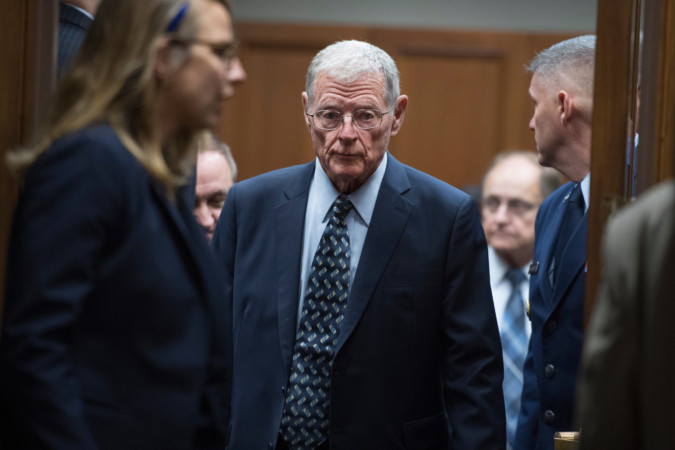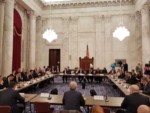OPINION — Two years ago, the National Defense Strategy, or NDS, shifted America’s military focus to a new era of great-power competition, especially with China and Russia. Welcomed with broad bipartisan support, this groundbreaking document calls on us to make tough choices to reshape our military, reform the Department of Defense, and recommit to strengthening alliances and attracting new partners around the world.
President Donald Trump has committed to rebuilding the foundations of American military power. The NDS provides the blueprint to achieve that objective, and it must be fully implemented. That is why we have made it our priority on the Senate and House Armed Services committees to ensure that we turn the NDS from a strategy on paper into a strategy in action.
The good news is that the Department of Defense has made progress toward this goal. The Army trimmed 200 programs and reprioritized savings toward modernizing key capabilities. The Air Force is conducting a similar initiative. The Navy has redoubled its efforts to preserve America’s undersea advantage. And the commandant of the Marine Corps has released compelling “planning guidance” that signals a promising transformation to come.
But there’s still a lot of work left to do, especially in earning the support of the American people for the NDS. We must start asking ourselves some hard questions and expand the conversation beyond Washington. The Senate Armed Services Committee is holding hearings this month, and the House Armed Services panel established a bipartisan task force to explore these issues in-depth. We hope this will be the focus at the Reagan National Defense Forum in California this weekend. Here are just a few of the hard questions on our minds.
Are we prepared to make the tough decisions required by the NDS?
The NDS can tolerate few sacred cows, but it will require many gored oxen. “Nice to have” programs will have to be cut. Roles and missions of the military services may change. Our troop deployments around the world must better reflect our focus on China and Russia. Some defense agencies will shrink. Pentagon leaders have talked a lot about what they’re “doing” to implement the NDS. We’d like to hear more about what they’re “not doing.” Frankly, if the NDS is fully implemented, there should be voices of discontent across the Pentagon and Washington. At the moment, such voices are eerily quiet.
Are we prepared to resource the NDS?
We can’t buy our way out of the problems our military faces. But there’s no doubt that meeting our present challenges will require sufficient, sustained and predictable funding. If past is prologue, the NDS is in trouble. Recently, Congress has been unable to do even the bare minimum: pass a defense authorization or appropriations bill on time. Washington budget battles continue to hold resources our military needs hostage to partisan debates about domestic programs. Over the longer term, our growing deficit and debt will continue to place downward pressure on defense spending unless and until we summon the courage to reform our entitlement programs.

Does the NDS have bipartisan buy-in?
The Armed Services committees have historically been the most bipartisan in Congress, a tradition preserved by putting our troops ahead of politics. We’ve been able to find agreement with our Democratic colleagues on many important issues, including the need for NDS implementation. However, we worry this bipartisan support for NDS implementation will fall victim to politics. Here’s just one example: Sen. Elizabeth Warren wants to cut our military by $800 billion over 10 years to pay for “Medicare for All.” The budget for our troops should be designed to compete against China and Russia, not to win a Democratic presidential primary. If the NDS is going to survive, both parties have to mean it when they say our military is our top priority.
Do the American people support the NDS?
More often than not, Americans outside Washington believe our military has the best of everything and that no other military in the world could challenge us. The NDS explicitly warns the opposite. Consider the recently released Reagan National Defense Survey. When asked where the United States should focus its military forces, a central question of the NDS, 37 percent of respondents answered the Middle East compared to just 16 percent for East Asia, the Pentagon’s “priority theater.” In fact, more respondents answered “Don’t know” than East Asia.
If there is a consensus about the National Defense Strategy, it’s a Washington consensus, and a fragile one at that. If the NDS is to last, it must be supported by an American consensus.
Want insight more often? Get Roll Call in your inbox
Political leaders of both parties, from the president on down, have to remind the American people at every opportunity that we are in a competition. This is not a competition “against” China or any other nation. It is a competition “for” influence to shape the kind of world our children and grandchildren are going to live in.
We’re not going to win this competition with a strong military alone — but we will lose it without one. These are the stakes for the NDS: revitalizing American military power so that America can achieve its vision of a safe, prosperous and free world.
Sen. James M. Inhofe is a Republican representing the state of Oklahoma. He chairs the Senate Armed Services Committee.
Rep. Mac Thornberry is a Republican representing Texas’ 13th District. He serves as ranking member of the House Armed Services Committee.
Get breaking news alerts and more from Roll Call on your iPhone.






Leave a Reply